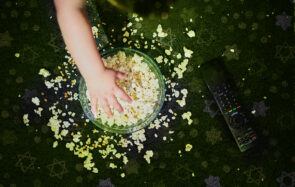
My daughters are old enough to understand what a storm is, and that it’s loud and scary, even when we’re inside the house.
As we spent all day Monday inside, passing the time with markers, stickers, books, and a screening of Cinderella, my 4-year-old was a little more fragile than usual. She fell into tears and fussiness quickly and often, and I know it was because of the gusting wind outside. I just kept reminding her that we were safe and dry inside, and it seemed to help a bit.
I didn’t turn on the news until after the girls were in bed; I didn’t want them to see the heartbreaking images of partially-submerged cars, entire streets underwater, and homes destroyed. We’re fortunate enough that they don’t yet know that such destruction is a possibility. I know the time will come, though, and they will learn. And I will have to explain.
All of this got me thinking: how does one make sense of natural disasters? What can we learn from something as destructive and overwhelming as Hurricane Sandy?
I definitely don’t have all the answers, but I have a few thoughts about what I hope to say to my daughters when they are old enough to understand:
1. Bad things happen. This may sound like a cop-out, but it’s not. It’s a way of understanding the world, and acknowledging that we don’t always have to look for someone to blame, that not everything is someone’s fault. (This is different from the message that we shouldn’t take responsibility for helping those who were impacted, and for trying to address the underlying causes, when they can be identified.)
2. Control is an illusion. This may be more of a lesson for me to learn, but it’s an important one. The underlying message of the parenting advice of my generation is that if we parents simply do the right thing, our children will grow up to be healthy, happy, smart, and successful. Spend five minutes with any grandparent, and the response will likely be somewhere between a knowing smirk and an outright laugh. Control–over our children, the weather, even our belongings–is a fantasy. (I certainly cling to this one dearly, but it’s important to be reminded of the truth every once in awhile.)
3. It’s just stuff. It’s easy for me to say this, as I didn’t even lose power during this storm. Nonetheless, I’m hoping to teach my daughters this important value that I myself am still struggling to learn–that our attachment to stuff can cloud our judgment, cause us unnecessary distress, and distract us from what really matters. At the end of the day, what really matters is our family, our health, and the strength of our relationships.
4. Some stuff matters. I’m not talking about the Princess Play-Doh Castle or the blank notebooks I can’t seem to stop buying. I’m talking about my great-grandfather’s silver baby cup from 1876 or the candlesticks that traveled across the ocean from Germany with my husband’s great-grandparents. I have albums from my childhood, my wedding, and my daughters’ first years; cards that my mother faithfully sends to the girls every month, and a
tzedakah
box that my husband and I made together (back before we had kids, and actually had to find ways to fill our time). These irreplaceable pictures and objects hold memories and stories, they remind us of moments long passed and family members we may have never met, but will always remember. Yes, they’re just things, but when they are gone, we mourn their loss, and the loss of what they represent.
5. People are resilient. We are all so much stronger than we know. We mothers learned this in small ways as we struggled through debilitating fatigue, sadness, and anxiety each day in order to get out the door to play dates and music classes. The heroes of Hurricane Sandy, including the nurses who carried NICU babies down nine flights of stairs while manually pumping oxygen into their tiny lungs, reminded us of this in very big ways. I hope my daughters never have to endure the kind of crisis that will require such heroism, but I also hope we are raising them to be the kind of people who will step up if necessary.
6. We all have a responsibility to help each other, because it could be us next. I haven’t talked to the girls about the tremendous losses sustained by so many in New York, New Jersey, and across the eastern seaboard, which means I also haven’t yet explained to them why my husband and I are donating to the Red Cross. But we are, and we will, and when the time is right, we will be doing it with our daughters. Because when the next storm comes, we might be the ones who need help.
I wish I didn’t have to teach any of these lessons to my daughters, but I also know that, at least for now, I am fortunate to have the choice. Meanwhile, I have been thinking about my friends, family, and so many others that I will never meet, since the first raindrop fell on Sunday afternoon. To all of you who are still without shelter or power, please know that I, along with hundreds of thousands of your fellow Americans, are following your story, praying for the best, and helping however we can.







